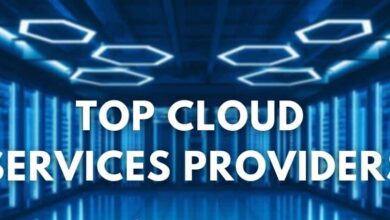Difference Between Public and Private Cloud: Exploring Cloud Computing

Cloud computing has revolutionized the way businesses and individuals store and access data. With its numerous advantages and flexibility, it has become a popular choice for organizations of all sizes. However, when it comes to cloud computing, there are two main options to consider: public and private cloud. In this article, we will delve into the key differences between public and private cloud, helping you make an informed decision that best suits your needs.
Contents
A. Definition of Cloud Computing

Before we dive into the differences, let’s establish a clear understanding of cloud computing. In simple terms, it refers to the delivery of computing services, including storage, servers, databases, software, and more over the internet. Instead of relying on local servers or personal devices, cloud computing allows users to access and manage their data remotely, saving time and resources.
B. Overview of Public and Private Cloud
Public and private cloud are two distinct variations of cloud computing, each offering unique features and benefits. Understanding their fundamental differences is crucial in determining which option aligns with your requirements.
Public cloud refers to the cloud infrastructure owned and operated by third-party providers. These providers offer services to multiple organizations or individuals over the internet. With a public cloud, resources are shared among multiple users, making it a cost-effective solution. Popular public cloud providers include Amazon Web Services (AWS), Microsoft Azure, and Google Cloud Platform.
On the other hand, private cloud is dedicated to a single organization and can be hosted on-premises or by a third-party. Unlike public cloud, private cloud resources are exclusive to the organization, providing enhanced control, security, and customization options. Private cloud is often preferred by organizations with strict data privacy and compliance requirements.
Now that we have a solid foundation, let’s delve deeper into the differences between public and private cloud. Stay tuned for the next section where we will explore the advantages and considerations of public cloud.
Understanding Public Cloud
A. Definition and Characteristics
Public cloud refers to a cloud computing model where resources and services are provided by third-party vendors over the internet. In this model, the infrastructure is shared among multiple users, allowing for cost-effective and scalable solutions. Public cloud providers offer a wide range of services, including storage, computing power, and applications, which can be accessed on-demand.
Public cloud is characterized by its accessibility and ease of use. With just an internet connection, users can access their data and applications from anywhere in the world. This level of convenience makes public cloud an attractive option for businesses, as it eliminates the need for maintaining and managing physical infrastructure.
B. Advantages and Benefits
One of the primary advantages of public cloud is its cost-effectiveness. By utilizing shared resources, organizations can significantly reduce their infrastructure costs. Public cloud providers operate on a pay-as-you-go model, allowing businesses to only pay for the resources they consume. This scalability ensures that organizations can easily scale up or down depending on their needs, without the need for significant upfront investments.
Another benefit of public cloud is its high level of reliability and uptime. Public cloud providers have robust infrastructure and redundancy measures in place, ensuring minimal downtime and uninterrupted service. Additionally, public cloud services often offer automatic backups and disaster recovery options, providing peace of mind to businesses.
C. Limitations and Considerations
While public cloud offers numerous advantages, there are also limitations and considerations to keep in mind. One key concern is data security and privacy. Since public cloud resources are shared among multiple users, there is a potential risk of unauthorized access or data breaches. Organizations dealing with sensitive data or operating in highly regulated industries may need to consider additional security measures or opt for a private cloud solution.
Another consideration is the lack of customization and control. In a public cloud environment, users have limited control over the underlying infrastructure and software. This can hinder organizations with unique requirements or specific compliance needs. It’s essential to assess whether the available features and configurations meet your business needs before opting for a public cloud solution.
In the upcoming section, we will explore the concept of private cloud, highlighting its distinct characteristics, advantages, and considerations.
Exploring Private Cloud
A. Definition and Characteristics
Private cloud is a cloud computing model that offers dedicated resources exclusively to a single organization. Unlike a public cloud, where resources are shared among multiple users, a private cloud provides enhanced control, security, and customization options. It can be hosted on-premises, within the organization’s data center, or by a third-party service provider.
Private clouds offer several key characteristics that differentiate them from public clouds. Firstly, privacy and data security are paramount in a private cloud environment. Organizations have complete control over their data, ensuring it remains protected and compliant with industry regulations. Additionally, a private cloud provides a higher level of customization, allowing organizations to tailor the infrastructure and services to their specific needs.
B. Advantages and Benefits
-
Enhanced Security: One of the significant advantages of utilizing a private cloud is the heightened level of security it offers. As data is not shared with other organizations, there is a reduced risk of breaches or unauthorized access. This is especially crucial for businesses dealing with sensitive or confidential information.
-
Greater Control: With a private cloud, organizations have full control over their infrastructure, applications, and data. This control allows for more flexibility in managing resources, implementing customized security measures, and maintaining compliance with industry standards.
-
Customization: Private clouds provide the ability to customize the infrastructure and services to suit the specific needs of the organization. This level of customization ensures that the cloud environment aligns perfectly with the organization’s requirements, maximizing efficiency and performance.
C. Limitations and Considerations
While private clouds offer numerous benefits, there are some limitations and considerations to keep in mind:
-
Cost: Private clouds require significant upfront investment in hardware, software, and maintenance. Organizations must also allocate resources for ongoing management and support. It’s essential to evaluate the cost-effectiveness of a private cloud compared to other cloud options.
-
Scalability: Private clouds may have limited scalability compared to public clouds. Scaling resources in a private cloud environment requires additional infrastructure and planning, making it less agile in handling sudden spikes in demand.
-
Expertise and Maintenance: Managing a private cloud requires specialized IT expertise. Organizations need to consider whether they have the necessary resources and skills to maintain and update the infrastructure effectively.
By understanding the definition, characteristics, advantages, and limitations of private cloud, organizations can make an informed decision about the most suitable cloud computing model for their specific requirements. In the next section, we will explore the key differences between public and private cloud, shedding light on critical factors to consider when choosing the right cloud solution.
Key Differences between Public and Private Cloud
When deciding between public and private cloud, it’s crucial to understand the significant differences that exist between the two options. Let’s explore these differences in more detail:
A. Ownership and Control
One of the primary distinctions between public and private cloud lies in ownership and control. In a public cloud, the infrastructure is owned and managed by a third-party provider. This means that you have limited control over the hardware, software, and infrastructure configurations. Conversely, in a private cloud, you have exclusive ownership and control over the infrastructure, allowing for greater customization and adherence to specific organizational needs.
B. Security and Privacy
Security and privacy considerations are paramount when it comes to cloud computing. Public clouds, due to their multi-tenant nature, may raise concerns regarding data security. While reputable public cloud providers implement robust security measures, some organizations with sensitive data may prefer the added security offered by a private cloud. With a private cloud, you have more control over data access and can implement stringent security protocols tailored to your specific requirements.
C. Cost and Scalability
Cost and scalability are important factors to consider when evaluating cloud options. Public clouds generally follow a pay-as-you-go model, allowing organizations to scale resources as needed without significant upfront costs. This scalability makes public cloud an attractive choice for startups and businesses with fluctuating resource demands. Private clouds, in contrast, may require substantial upfront investments in hardware and infrastructure. However, they offer greater predictability and control over costs in the long run, making them more suitable for organizations with consistent resource needs.
D. Customization and Flexibility
Customization and flexibility are key considerations for organizations with unique requirements. Public clouds offer standardized services and configurations, limiting customization options. In contrast, private clouds provide the flexibility to tailor infrastructure, network settings, and security measures to match specific business needs. This level of customization is particularly beneficial for organizations operating in highly regulated industries or those with specific compliance requirements.
By understanding these key differences, you can make an informed decision about which cloud option best aligns with your organization’s goals and requirements. Next, we will explore the factors to consider when choosing the right cloud solution. Stay tuned for the following section.
Choosing the Right Cloud Solution
In the previous sections, we have discussed the differences between public and private cloud, shedding light on their unique attributes. Now, let’s explore the factors to consider when choosing the right cloud solution for your specific needs.
A. Factors to Consider
When deciding between public and private cloud, it is essential to evaluate several key factors:
-
Security Requirements: Consider the sensitivity of your data and the level of security needed. Private cloud offers a higher level of control and data isolation, making it suitable for organizations handling confidential information.
-
Compliance: If your business operates in a regulated industry with specific compliance requirements, such as healthcare or finance, it is crucial to ensure that your chosen cloud solution meets these standards.
-
Scalability: Assess your organization’s growth potential and the scalability needed to accommodate increasing data and user demands. Public cloud solutions often offer greater scalability, allowing you to easily adjust resources according to your needs.
-
Cost: Analyze your budget and determine the cost implications of each cloud option. Public cloud typically involves a pay-as-you-go model, making it more cost-effective for small to medium-sized businesses. Private cloud, while offering greater control, may involve higher upfront costs.
B. Use Cases for Public and Private Cloud
To make an informed decision, it’s crucial to understand the common use cases for public and private cloud:
-
Public Cloud Use Cases: Public cloud is ideal for startups, small businesses, or organizations with fluctuating workloads. It provides cost-effective infrastructure, scalability, and accessibility for applications, development environments, and non-sensitive data storage.
-
Private Cloud Use Cases: Private cloud is often preferred by enterprises with stringent security and compliance needs. Industries such as healthcare, finance, and government sectors that handle sensitive data and require greater control over resources can benefit from private cloud solutions.
C. Hybrid Cloud as an Alternative
In some cases, neither public nor private cloud may fully meet your requirements. This is where hybrid cloud comes in as a viable alternative. Hybrid cloud combines both public and private cloud environments, allowing organizations to leverage the benefits of each. It offers flexibility, scalability, and the ability to allocate workloads based on specific needs. Hybrid cloud is particularly useful for businesses with varying workloads and data sensitivity levels.
By considering the factors mentioned above and assessing your specific use cases, you can confidently choose the cloud solution that aligns with your organization’s goals and requirements. In the next section, we will conclude our exploration of the differences between public and private cloud.
Choosing the Right Cloud Solution
When it comes to selecting the right cloud solution for your organization, several factors need to be considered. Let’s explore some key considerations to help you make an informed decision.
Factors to consider
-
Data Security and Privacy: If you handle sensitive data or have strict compliance requirements, a private cloud might be the best choice. With exclusive control over your resources, you can implement robust security measures and maintain compliance with regulations. However, public cloud providers also offer stringent security measures, making them suitable for many organizations.
-
Cost and Scalability: Public cloud services are typically more cost-effective, as the costs are distributed among multiple users. They also provide scalability, allowing you to quickly scale up or down based on your needs. Private cloud solutions, while offering greater control, may require a higher upfront investment for hardware and infrastructure.
-
Customization and Flexibility: Private cloud solutions offer more customization options, allowing you to tailor the infrastructure to your specific requirements. This level of flexibility is beneficial for organizations with unique needs or specialized applications. Public cloud services, although less customizable, provide a wide range of pre-configured options and services.
Use cases for public and private cloud
-
Public Cloud Use Cases: Public cloud is an ideal choice for startups, small businesses, or organizations with fluctuating workloads. It offers cost-effective solutions, easy scalability, and access to a wide range of services. Additionally, public cloud is well-suited for applications that require high availability and global reach.
-
Private Cloud Use Cases: Organizations that handle sensitive data, such as healthcare providers, financial institutions, or government agencies, often opt for private cloud solutions. Private cloud is also suitable for businesses with strict compliance requirements, the need for complete control over resources, or specialized applications that demand customization.
Hybrid cloud as an alternative
In some cases, a hybrid cloud solution can be the ideal choice, combining the benefits of both public and private cloud. A hybrid cloud environment allows organizations to leverage the scalability and cost-effectiveness of public cloud while maintaining sensitive data and critical applications on a private cloud. This approach provides greater flexibility and can be tailored to meet specific business needs.
In conclusion, choosing between public and private cloud depends on several factors, including data security, cost, flexibility, and specific use cases. Assessing your organization’s requirements and understanding the strengths and limitations of each option will guide you towards the most suitable cloud solution. Remember, Cloud.tapchiai.net is here to assist you in making the right choice and optimizing your cloud infrastructure for success.
Conclusion: So above is the Difference Between Public and Private Cloud: Exploring Cloud Computing article. Hopefully with this article you can help you in life, always follow and read our good articles on the website: Cloud.tapchiai.net




